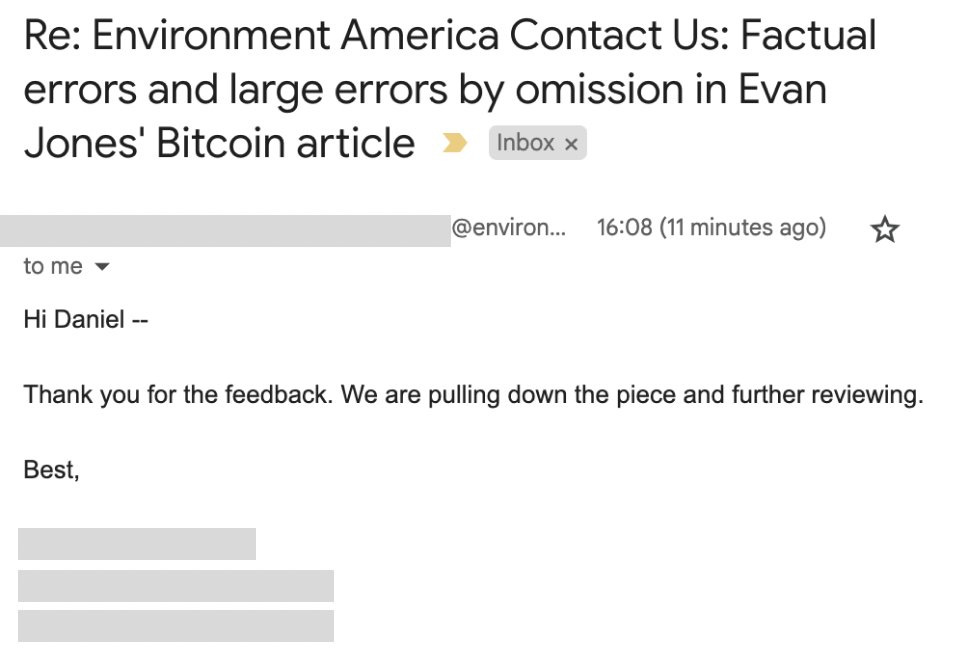Anti-Bitcoin"Change the Code" Campaign Ends
GreenpeaceUSA’s Change the Code campaign has been suspended. As of today, there’s been no action, posts, or media releases for 6 months. The Change The Code (@cleanupbitcoin) handle has been inactive since Jan 2024. the former campaign director Josh Archer left GreenpeaceUSA to join Stand, a grassroots organization protecting endangered forests.
Meanwhile, SierraClub, Earthjustice and EWG have not tweeted on Bitcoin and the environment for over a year. No other branches of Greenpeace publicly supported GreenpeaceUSA’s campaign.
The focus of this newsletter is mark a moment in history for Bitcoin, and to reflect on some important lessons learned.
Reflections
Cast your memory back to 2021-2: Elon Musk’s “environmental concerns” tweet about Bitcoin wiped $13.8K off the price.
Alex de Vries was publishing now-debunked commentaries against Bitcoin, the press spread his flawed research relentlessly. Then in March 2022, Ripple executive chair Chris Larsen gave GreenpeaceUSA $5Million to launch an anti-Bitcoin campaign.
But GreenpeaceUSA soon learned they had bitten off more than they could chew. The three core issues with their campaign were
The central tenants, that Bitcoin was bad for the environment, re-opened mothballed fossil fuel plants, and mainly used coal as a power source, all turned out to be incorrect.
Their tactics relied on whipping up moral outrage against large corporates who could be shamed into “environmental concessions” to avoid public scrutiny. This tactic did not work on a decentralized movement, particularly when it turned out they had the freedom to suggest a change in the code through a democratic process called a Bitcoin Improvement Proposal.
They underestimated the conviction and power of a tide of Bitcoin-defenders, already battle-hardened through years of gaslighting.
Highlights reel
Here’s a few choice moments from Bitcoiners’ riposte to ChangetheCode
Lyn Alden points out the hypocrisy in GreenpeaceUSA’s campaign. The post ratioed GreenpeaceUSA’s original post 14:1.
Troy Cross weighed in with ironic genius: 15x ratio.
Willy Woo captured the mood of the times.
The creator of the “Skull of Satoshi” changed his position on Bitcoin after engaging with environmentalists in the Bitcoin ecosystem.
GreenpeaceUSA’s almighty own-goal
For GreenpeaceUSA it was a harrowing campaign.
They squandered $5M to no effect: Zero code in Bitcoin changed. Zero financial institutes who were lobbied changed their stance on Bitcoin. By contrast, many millennial and GenZs turned off GreenpeaceUSA. Analyst Willy Woo estimating a loss of 35.7M per year in Greenpeace funding. Sources within GreenpeaceUSA admitted the campaign had been a complete failure.
For Bitcoiners by contrast, it was a poetic moment when a large, powerful, well financed NGO met a new grassroots movement of Bitcoiners who outplayed them at their own game: volunteer-based activism.

How data helped kill the change the code campaign
1. 13 peer reviewed studies showed that contrary to GreenpeaceUSA's claims, Bitcoin mining had many environmental benefits and promoted Climate Action, including stabilizing grids, obviating gas peaker plants, mitigating methane and accelerating the green energy transition.
2. The writer, Central bank employee Alex de Vries, upon whose study the Change the Code campaign was based, had his work discredited in 4 academic journals. ( Sai and Vraken, Masanet et al, 2019, Dittmar et al. 2019, Sedlmeir et al, 2020)
3. 7 sustainability magazines came out in support of Bitcoin mining
4. Germany’s largest Telco and Japan’s largest Utility started using Bitcoin mining on their otherwise wasted renewable energy.
5. The Bitcoin network was shown by Bloomberg Intelligence, and The Digital Assets Research Institute to use more than 50% sustainable energy, the largest percentage of any industry in the world
6. 19 humanitarian benefits of Bitcoin were documented, most being to those in the global south.
7. Almost all mainstream news outlets stopped gaslighting Bitcoin mining completely, while several (The Independent, Bloomberg, Financial Times, Forbes, Unherd, MSN, The Hill, Euro News, Technology Review, Yahoo Finance, The Street, Reuters) began publishing stories on Bitcoin mining's environmental benefits.
8. Just last week, Environment America, when challenged for putting up incorrect information on Bitcoin mining, retracted their article.
What can we learn from this?
In a nutshell: Truth is necessary, but not enough
The truth always needs people to espouse the truth. Many Bitcoiners have played their part in turning the tide.
Now the work really begins. Most renewable generators, utilities, grid operators, investment committees and regulators still believe the narrative perpetuated by GreenpeaceUSA and others that Bitcoin is bad for the environment. Because the energy transition cannot effectively happen without Bitcoin mining, this false narrative has helped hold back the renewable transition by two years. This is not the first time that activism, divorced from thoughtful research and planning, has ended up actually harming the climate.
Downplaying the size of the climate challenge won’t help either. We need to acknowledge the size of the challenge we face while dispassionately exploring the solutions that can solve this. The data, backed up by experiential wisdom, tells us that Bitcoin mining is very much a part of this solution.
The end of the ChangetheCode campaign represents hope to get back on track. Happily, green shoots are already emerging. Since September, huge industries including Tepco, Deutsche Telekom and Cango announced they are already using Bitcoin mining to solve their wasted renewable energy problems.
While GreenpeaceUSA could still pick up the campaign again, for now it would seem their campaign is over. Now the re-education work begins, so we can get the renewable energy transition back on track.
Final note
We just hit our own first small milestone: 1000 subscribers. On behalf of Daniel Batten and Elvis Gwaro at the Bitcoin ESG Forecast, thank you. You were one of the very first. Without changing the ESG narrative there can be no mainstream adoption of Bitcoin. Your sharing and supporting the research we do is making a difference.











Awesome job well done.
Excellent article, Daniel! Thanks so much for writing it